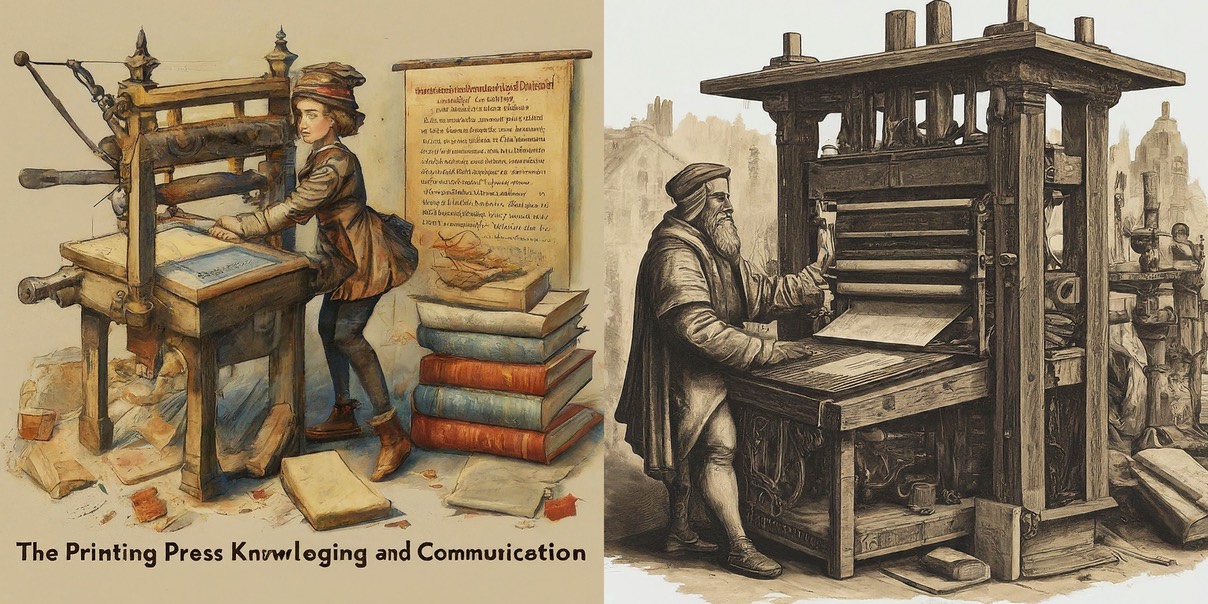
Explore how Gutenberg's printing press democratized knowledge and revolutionized communication in the 15th century. #History #Innovation #Knowledge
The invention of the printing press by Johannes Gutenberg in the 15th century stands as one of the most significant milestones in human history. This transformative innovation democratized knowledge dissemination, fundamentally altering the course of communication and education. #PrintingPress #JohannesGutenberg #KnowledgeRevolution
A Turning Point in History
The Birth of the Printing Press
Johannes Gutenberg, a German blacksmith, goldsmith, and inventor, introduced the movable-type printing press around 1440. This groundbreaking technology revolutionized the way information was produced and shared. Before this, books were painstakingly copied by hand, a process that was both time-consuming and expensive. Gutenberg’s invention changed all that. #HistoricalMilestone #Innovation
The Mechanics of Change
Gutenberg’s printing press utilized movable type, a method that allowed individual letters and characters to be rearranged and reused. This not only sped up the printing process but also significantly reduced the cost of producing books. As a result, literature, scientific works, and other forms of written communication became more accessible to the general public. #MovableType #CostEffective #Efficiency
Democratizing Knowledge
Accessibility for the Masses
One of the most profound impacts of the printing press was its role in democratizing knowledge. Before its invention, literacy was largely confined to the elite classes and religious institutions. The printing press enabled the mass production of books, which in turn made them affordable and widely available. This democratization of knowledge led to an increase in literacy rates and the spread of new ideas. #EducationForAll #Literacy
The Spread of Ideas
The printing press played a crucial role in the Renaissance, Reformation, and the Scientific Revolution. By making information more accessible, it facilitated the rapid dissemination of new ideas and knowledge. Scholars and thinkers could now share their discoveries and theories with a much larger audience, fostering an environment of intellectual growth and cultural development. #Renaissance #ScientificRevolution #Reformation
Transforming Communication
From Manuscripts to Mass Media
The shift from hand-copied manuscripts to printed books marked the beginning of a new era in communication. The printing press made it possible to produce large quantities of identical texts, ensuring consistency and accuracy in the transmission of information. This reliability helped to build a foundation for modern mass media. #MassMedia #CommunicationRevolution
The Evolution of Publishing
Gutenberg’s invention laid the groundwork for the modern publishing industry. Over time, printing technology continued to evolve, leading to faster and more efficient methods of producing written materials. Today, we enjoy a diverse and vibrant publishing landscape, all thanks to the initial spark of innovation ignited by Gutenberg’s printing press. #PublishingIndustry #InnovationLegacy
Johannes Gutenberg's printing press was more than just a technological advancement; it was a catalyst for cultural and intellectual transformation. By making knowledge more accessible, it empowered individuals, fostered the spread of new ideas, and laid the groundwork for future innovations. The impact of the printing press continues to resonate in our modern world, reminding us of the power of innovation to shape society. #LegacyOfInnovation #KnowledgePower
The printing press by Johannes Gutenberg in the 15th century not only democratized knowledge dissemination but also transformed communication, fostering an environment of intellectual growth and cultural development. Its legacy lives on, continually inspiring us to value and pursue the spread of knowledge. #Inspiration #KnowledgeDissemination #CulturalTransformation